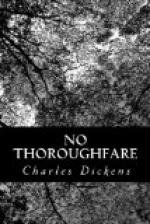“Go on,” said Vendale.
“On?”
“On? Yes. Across the Alps, and down to Milan.”
Obenreizer stopped in his smoking to look at Vendale, and then smoked heavily, looked up the road, looked down the road, looked down at the stones in the road at his feet.
“I have a very serious matter in charge,” said Vendale; “more of these missing forms may be turned to as bad account, or worse: I am urged to lose no time in helping the House to take the thief; and nothing shall turn me back.”
“No?” cried Obenreizer, taking out his cigar to smile, and giving his hand to his fellow-traveller. “Then nothing shall turn me back. Ho, driver! Despatch. Quick there! Let us push on!”
They travelled through the night. There had been snow, and there was a partial thaw, and they mostly travelled at a foot-pace, and always with many stoppages to breathe the splashed and floundering horses. After an hour’s broad daylight, they drew rein at the inn-door at Neuchatel, having been some eight-and-twenty hours in conquering some eighty English miles.
When they had hurriedly refreshed and changed, they went together to the house of business of Defresnier and Company. There they found the letter which the wine-carrier had described, enclosing the tests and comparisons of handwriting essential to the discovery of the Forger. Vendale’s determination to press forward, without resting, being already taken, the only question to delay them was by what Pass could they cross the Alps? Respecting the state of the two Passes of the St. Gotthard and the Simplon, the guides and mule-drivers differed greatly; and both passes were still far enough off, to prevent the travellers from having the benefit of any recent experience of either. Besides which, they well knew that a fall of snow might altogether change the described conditions in a single hour, even if they were correctly stated. But, on the whole, the Simplon appearing to be the hopefuller route, Vendale decided to take it. Obenreizer bore little or no part in the discussion, and scarcely spoke.
To Geneva, to Lausanne, along the level margin of the lake to Vevay, so into the winding valley between the spurs of the mountains, and into the valley of the Rhone. The sound of the carriage-wheels, as they rattled on, through the day, through the night, became as the wheels of a great clock, recording the hours. No change of weather varied the journey, after it had hardened into a sullen frost. In a sombre-yellow sky, they saw the Alpine ranges; and they saw enough of snow on nearer and much lower hill-tops and hill-sides, to sully, by contrast, the purity of lake, torrent, and waterfall, and make the villages look discoloured and dirty. But no snow fell, nor was there any snow-drift on the road. The stalking along the valley of more or less of white mist, changing on their hair and dress into icicles, was the only variety between them and the gloomy sky. And still by day, and still by night, the wheels. And still they rolled, in the hearing of one of them, to the burden, altered from the burden of the Rhine: “The time is gone for robbing him alive, and I must murder him.”




